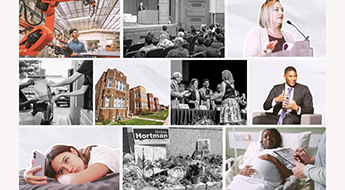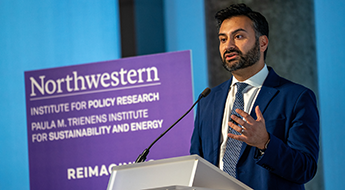Bringing Chicago’s Early Childhood Community Together
EC*REACH shares a community-driven research agenda at its launch
Get all our news
The goal is to facilitate collaborations across researchers, city agencies, programs, policy, philanthropy, and families to produce research that can be transformational for Chicago's children.”
Terri Sabol
IPR developmental psychologist
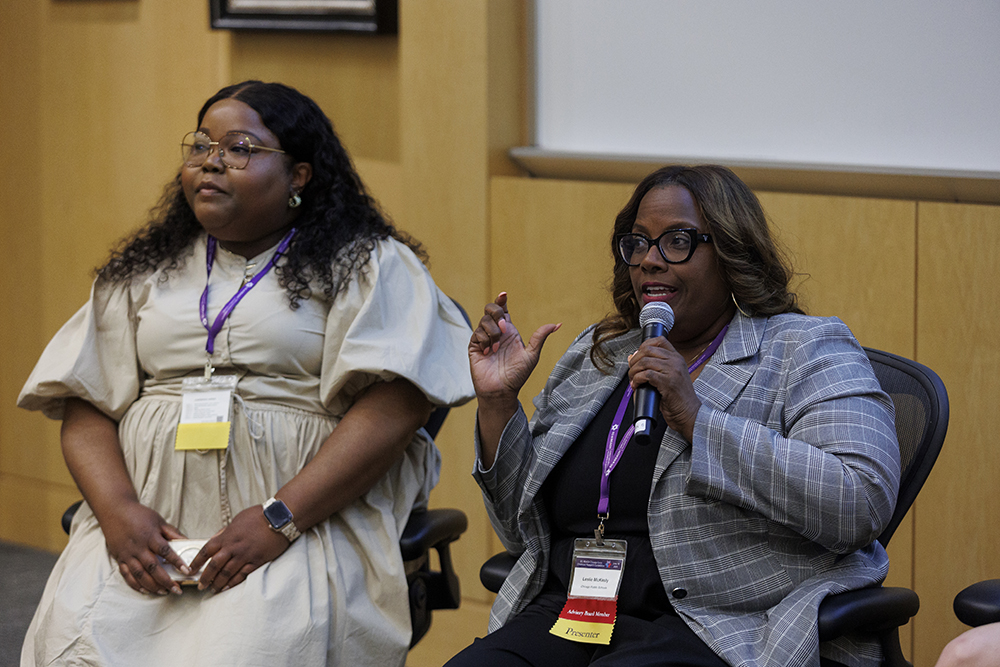
During a panel at EC*REACH's launch conference, Marquinta Thomas and Leslie McKinily (left to right) discuss early childhood education and care in Chicago.
On June 10 in downtown Chicago, nearly 250 attendees gathered for the city’s first early childhood research conference in seven years. Hosted by the Early Childhood Research Alliance of Chicago (EC*REACH), the launch conference brought together almost 100 researchers and 70 educators and service providers, along with policymakers, early childhood thought leaders, funders, and community organizers. They represented over 100 different organizations and institutions around the city.
Highlights included keynotes from Vivian Tseng of the Foundation for Child Development and Cristina Pacione-Zayas from the Chicago Mayor’s Office. They bookended a conference focused on discussions around key community and research issues.
Led by faculty co-directors Terri Sabol and Diane Whitmore Schanzenbach, executive director Maia Connors, and senior advisor and advisory board chair John Q. Easton, EC*REACH seeks to be a research hub in the city and is housed at the Institute for Policy Research (IPR) at Northwestern University. With a team of faculty and staff, the research alliance produces relevant and rigorous research about early childhood care and education in Chicago. It also works to facilitate partnerships with early childhood organizations to identify important issues to investigate.
“At EC*REACH and for many of us in Chicago, we think that we can do better by thinking holistically about our understanding of how policies and programs interact with one another,” Schanzenbach said during opening remarks. “And then we can work together to find new ways to optimize the limited investments that we are making in children.”
The research alliance stands on three pillars: conduct rigorous research, harness data for research, and gather and connect the early childhood community. With the mission to find “research-powered answers to community-driven questions,” EC*REACH will work closely with the community to bridge the divide between researchers and those working in early childhood policy and practice.
Launching a Research Alliance | Developing an Early Childhood Research Agenda | Early Childhood's 'Pivot Moment'
Launching a Research Alliance
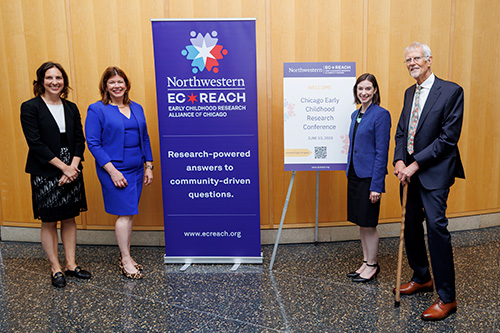
EC*REACH's leadership team: Terri Sabol, Diane Schanzenbach,
Maia Connors, and John Q. Easton (left to right).
In fall 2020, the city of Chicago and Start Early, an early childhood nonprofit, launched Every Child Ready Chicago (ECRC)—a public-private partnership to create a shared vision for the early childhood ecosystem, young children, and their families.
“There was this general agreement that good evidence needed to get into the hands of decision-makers more quickly,” Sabol explained. “And it needed to be more deeply tied to the questions that could guide policymaking.”
Through ECRC, the group began to explore the possibility of creating a research consortium to support their initiatives. Around the same time, Sabol and Schanzenbach launched a study to examine Chicago’s expansion of its universal prekindergarten (pre-K) program for 4-year-olds. The study, in partnership with the Department of Family Support Services, Chicago Public Schools (CPS), and former Mayor Lori Lightfoot’s office, highlighted the potential to build deeper research-practice partnerships.
Sabol and Schanzenbach were selected to launch EC*REACH at IPR. In summer 2023, EC*REACH started building its team, including hiring Connors as its executive director. By February 2024, it had organized an agenda-setting task force that kicked off with a work session hosted at the Carole Robertson Center for Learning in North Lawndale. This effort brought together a diverse group of 45 providers, researchers, community and program leaders, parents, and policymakers to lay the groundwork for the research agenda they would introduce at the conference.
“What we seek to do here at EC*REACH is bring everyone together to make this work a little easier for all of us,” Sabol said. “The goal is to facilitate collaborations across researchers, city agencies, programs, policy, philanthropy, and families to produce research that can be transformational for Chicago's children.”
For example, over the past year, the nonpartisan alliance has released five rapid research reports from the universal pre-K study—fulfilling a key aim of sharing timely evidence with the Chicago community. Their findings look at the impact of Chicago’s universal pre-K program on capacity, enrollment, and programming in CPS and across neighborhoods.
“The people who are closest to early childhood programs and policies in Chicago have to make important decisions that have big consequences for children and families all the time—whether or not there is relevant evidence to work from,” Connors said. “At EC*REACH, we partner closely with members of Chicago’s early childhood community and strive to be nimble and responsive to get them the information they need to make informed decisions.”
Developing an Early Childhood Research Agenda for Chicago
During the June launch conference, panels centered on community-focused issues such as the early childhood education and care workforce, supporting new migrant families with young children, and maternal child health. The EC*REACH team designed the program to bring together key leaders—including researchers, policymakers, and advocates—to support the connection between research and practice.
Schanzenbach and Sabol shared their findings on CPS’s pre-K program rollout during one panel. They pointed out that while CPS has seen a decline in kindergarten enrollment, the pre-K program has steadily grown since it expanded in 2018–19.

Conference attendees gather in the atrium of Simpson Querrey Institute.
Connors also outlined the citywide research agenda created by the alliance and its partners outlining future directions for early childhood research.
The agenda highlights the need for research that helps Chicago’s early childhood community improve and reduce inequalities in children’s learning and development, children’s health and wellness, and the early childhood workforce. This research, Connors explained, should focus on Illinois’ priority populations, historically marginalized groups, and new migrant families with young children.
“We hope that this agenda will focus our attention and coordinate our efforts so that what we're doing is moving in a direction that can make real change,” Connors said. “Ultimately, we hope that all of us will use research more often to build a stronger early childhood ecosystem.”
Highlighting Early Childhood’s ‘Pivotal Moment’
In her keynote remarks, Pacione-Zayas, chief of staff to Chicago Mayor Brandon Johnson, argued that this is a “pivotal moment” for early childhood work due to additional investments from the city and state. These include the recent creation of Illinois’ first Department of Early Childhood. A former Illinois state senator who holds a PhD in educational policy studies, Pacione-Zayas has worked to support young children across her career, including through policy development at the Erikson Institute.
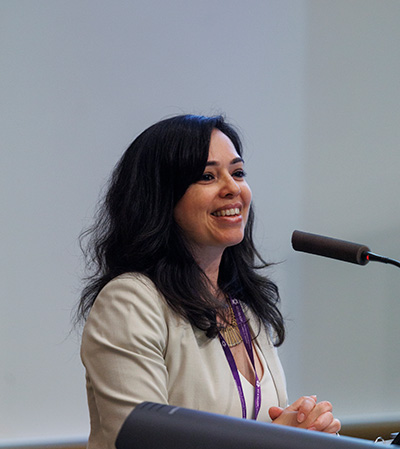
Cristina Pacione-Zayas gives keynote
remarks at the conference.
“This event alone, I'm sure will propel new research as well as deepen and extend the partnerships between researchers and community,” Pacione-Zayas said. She called EC*REACH an organization that “creates the table to ask the questions and ask if we are asking the right questions.”
In the conference’s keynote address, Tseng, president and chief executive officer of the Foundation for Child Development, reflected on the COVID-19 pandemic and the growing visibility of racial inequality over the past several years.
“How might this work be different now than if you had launched five years ago?” she asked. “How can we learn from the recent past?”
Easton praised Tseng for being “a little ahead of everyone else” by commissioning a white paper on research-practice partnerships when she was at the William T. Grant Foundation, co-authored by IPR associate Cynthia Coburn in 2013. Tseng encouraged EC*REACH to center the children most likely to be marginalized, embrace historical perspectives, and contend with power imbalances as they start their work.
“It sounds like there's a lot of excitement about investing in young children in the city,” Tseng said. “I hope that we’re moving on this journey together.”
Maia Connors is executive director of EC*REACH. Terri Sabol is an associate professor of human development and social policy. Diane Whitmore Schanzenbach is the Margaret Walker Alexander Professor. All are IPR faculty members. John Q. Easton is a senior advisor at IPR and advisory board chair for EC*REACH.
Photo credits: Laura McDermott
Published: July 17, 2024.
